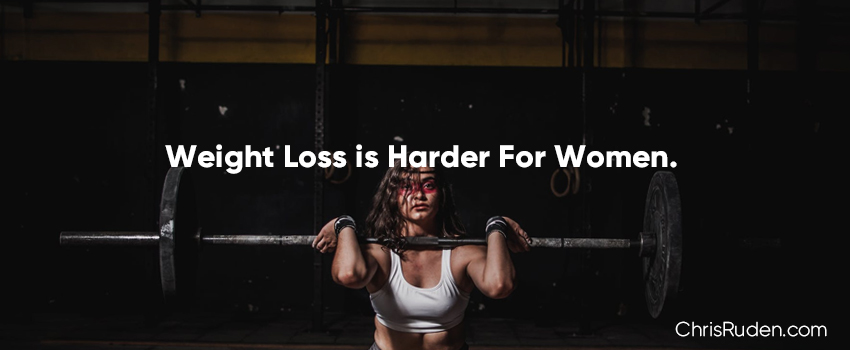Weight Loss is Harder For Women…And Here’s Why
Weight Loss & Women
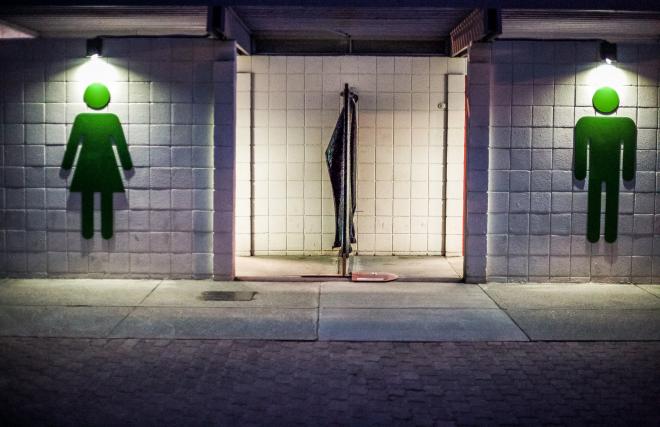
Ladies— have you ever noticed that when you try and lose weight, it seems more likely that you’ll win the lottery than slim down? And even though you are doing everything you can, your husband, boyfriend, or male friend can shed fat with ease.
If it seems like life is against you in terms of weight loss, that’s because… it kind of is.
Women are said to be given the ultimate responsibility— they are to keep humanity in existence. In nature, women are the ones responsible for procreating, ensuring future generations exist.
You women are designed to survive it all: from pregnancy to birth to starvation, there are specific, physiological & psychological gender differences that allow you to survive anything— kind of like superheros! Us guys are simply here to help you (and make your lives’ difficult of course).
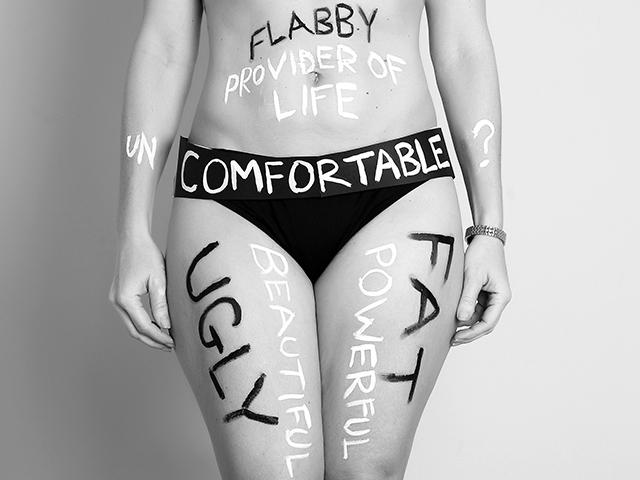
Given unrealistic standards and uncontrollable physiology that I’m going to revel to you in Part 2, it’s no wonder women have such a hard time losing weight!
Psychology of Women & Weight Loss

Did you know that women are:
- 3 times more likely to have some sort of eating disorder like anorexia or bulimia
- 4 times more likely to have confidence & self esteem issues
- almost 10 times more likely to feel that they have to look a certain way
Celebrities, fashion models and show hosts are often seen as role models, especially by teenagers. They appear to demonstrate what it is to be successful and popular. Their body weight, appearance and beauty are often associated with their popularity and wealth.
This is particularly obvious in what is referred to as thin-ideal media, a concept which has been looked at with interest by researchers in the field of social psychology. The term “thin-ideal media” refers to media images, shows and films that contain very thin female leads– similar to what is seen in a lot of fashion magazines, clothing catalogs and pop culture television shows.
Thin-ideal media highlights the idea that thinness is a good and desirable thing to be, even if it is to a level that is potentially damaging to a persons health.
Beauty sells, and this is somewhat of a problem when the media produce unattainable images for women. Eating disorders are often, though not always and not directly, related to negative body image.
Media images of ridiculously thin women are everywhere – television shows, movies, popular magazines. The media often glamorizes a very thin body for women. These are also the pictures that are being shown to teenagers in a time of their lives that they are particularly susceptible to peer pressure and looking good.
Due to this influence, poor body image can begin to develop at a very young age. Over 50% of 9 and 10 year-old girls feel better about themselves if they are on a diet — 9 and 10 year olds.
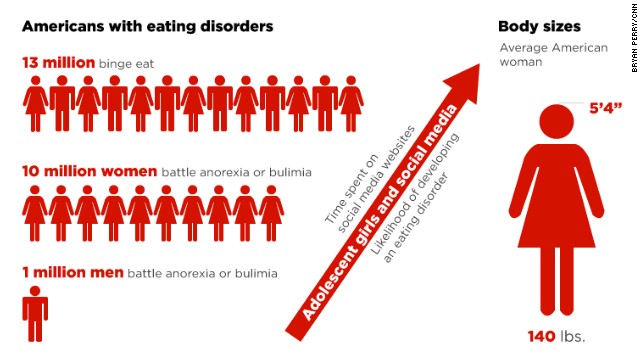
A Glamour Magazine study found that 97% of women are “cruel to their bodies” every day.[1] These self-criticisms are a subconscious assault on their own body image.
These internalized voices say, “You are lazy;” “Why did you eat that ice cream last night?” How come you can’t stay on a diet?” “You eat too much comfort food,” “Can’t you deal with your psychological problems and lose more weight?” This internalized “voice,” ignores that there was an assault, demonstrates no compassion for the pain, and blames the themselves for their suffering.
Eating disorders can have the following effects on weight loss:
- Insulin resistance leading to fat gain
- increased or decreased appetite leading to malnutrition
- metabolic damaging lowering daily calorie burn
- weight loss resistance in general
Overweight female adolescents with a positive body image gain significantly less weight as they become young adults than those with negative feelings about their bodies, according to research from the University of Minnesota published this week.
Eating disorders are a very serious issue so if you or someone you know suffers, please contact a medical professional to seek help.
Emotions & Weight Loss
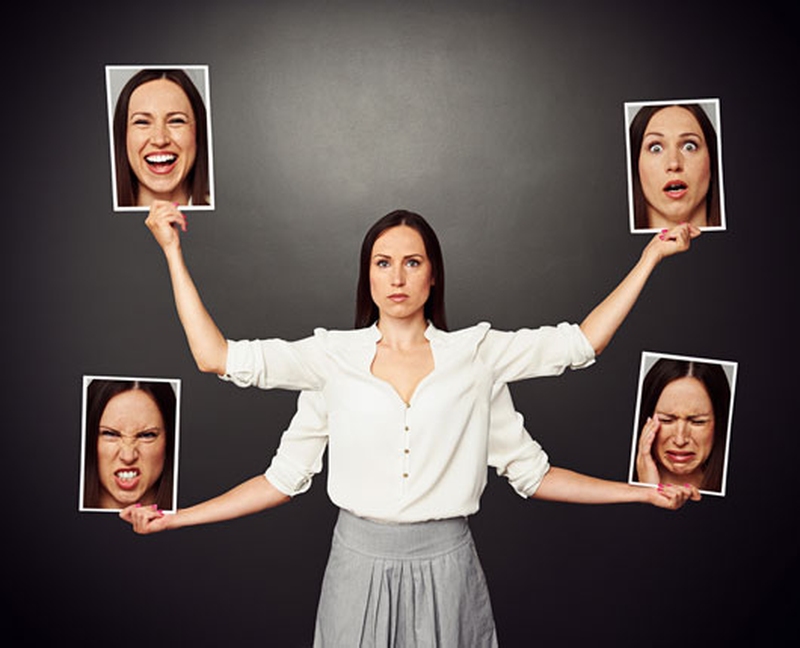
In a study comparing emotional reaction differences between men and women, researchers recruited 46 participants (25 female and 21 male) and ruled out potential contributing factors like age differences, education levels, marital status, ethnicity, and socioeconomic status.
Each volunteer was given a blood test at the beginning of the study to assess varying levels of estrogen and testosterone in order to see how they contributed to results. After the blood tests, participants were exposed to images that evoked positive, negative, or neutral emotions while undergoing MRI brain scans. Participants were also asked to review their emotional responses when looking at the images.
Overall, women reported being more reactive to the emotional images. Meanwhile, higher levels of testosterone were most frequently associated with lowered sensitivity to the images, while higher estrogen levels, regardless of the person’s sex, almost always meant increased sensitivity. More on the effect of estrogen and testosterone in female weight loss in part 2 here.
“Greater emotional reactivity in women may explain many things, such as their being twice as likely to suffer from depression and anxiety disorders to men.” said Adrianna Mendrek, researcher at the Institut Universitaire En Santé Mentale de Montréal.

Depression and anxiety can ruin desire to adhere to a fitness program, not to mention it can make simple tasks like leaving the house or eating difficult. Due to greater likelihood of occurrence, women can have a really hard time battling weight loss when their are busy battling depression or anxiety.
Progress
Most of my male clients I work with are pretty objective about the number on the scale, and view it simply as a piece of data. For many women, however, an increase, no change, or not enough of a decrease, can trigger feelings of frustration, anger, or depression, leading to a loss of motivation.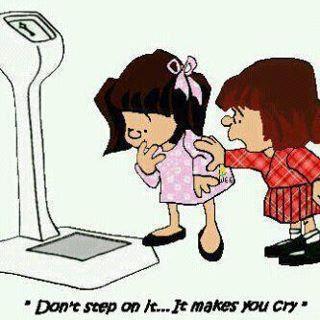
The truth is weight fluctuations are normal, no matter how much you weigh. And you could be losing body fat but still seeing no change on the scale because you’re more hydrated or gaining muscle.
The bottom line: You’ve got to focus on the pattern over time. You know your body better than anyone, so use other means of assessing how well you’re doing, including not just how you look and how your clothes fit, but also how you feel.
Emotional Eating
One of the top weight loss derailers for women is emotional eating. It can be true for men as well, but in my experience, there is a definite disparity. One reason is that most guys I work with have habitual activities that help them cope with stress, like playing sports or video games.
According to a 2008 study published in the Proceedings of the National Academy of Sciences, men are better able to handle self-control over food cravings than women are. Women show increased risk of depressive symptoms in life phases where ovarian steroid hormone levels fluctuate or decline rapidly. The risk mechanisms may include changes in mental state and affective cognition(3) which can definitely alter ability or desire to adhere to diet and training protocols.
But many of the women I consult either don’t have regular ways to blow off steam, or their usual outlets revolve around eating or drinking (girls’ night). If food has become your go-to way to either disconnect from intense emotions, or cope with them, no amount of willpower is going to break that pattern. The key is finding other healthy ways to address emotions so you won’t need chips, chocolate, or a sugary cocktail.
What works for one person may not work for another though, so you may need to try different things (meditation, art, crafts, music, writing) to find your non-food escape.
Behaviors & Weight Loss
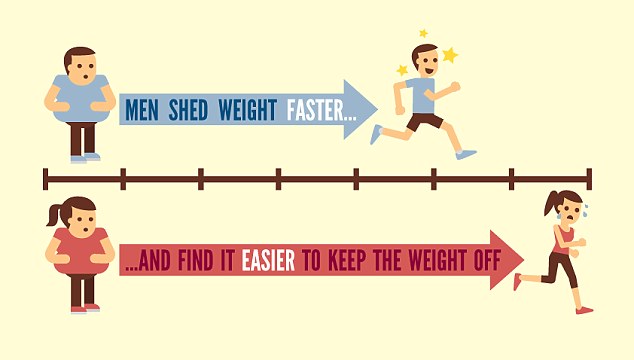
From emotional behaviors to physical behaviors, women generally take a different route than men. Let’s compare behaviors between men and women:
|
Men
|
Women
|
|
Tend to eat more protein and fat
|
Tend to eat more carbs and too little protein
|
|
Tend to lift heavy often
|
Tend to lift light weight and high reps or skip lifting altogether
|
|
Tend to do high intensity short duration cardio
|
Tend to do long, low intensity cardio
|
|
Tend to stress less
|
Tend to stress more
|
Breaking down these behaviors, women tend to eat more carbs (cravings based on time of the month plus emotional eating influence) and less protein. Protein helps build muscle and is the most important macronutrient in a weight loss program.
With working out, women are (for some odd reason) convinced that if they don’t sweat profusely, they didn’t workout enough. They like to do higher reps and more cardio even though most research points at heavier weight lifting to be more effective for fat loss.
Women also tend to stress more than men which I will discuss the cortisol effect in Part 2.
Higher stress levels and suboptimal training and nutrition methods give rise to lack of results, increased frustration, and ultimately lack of adherence.
Observational Experiment:
Now, it is not impossible for ladies to lose weight although some may be able to lose quicker than others.
“Psychology Today” In October of 2004 posted an article on its website detailing the experiences of Diane Berry, a nurse practitioner who studied women who had shed at least 15 pounds and had maintained their weight loss for an average of seven years.
- they had a firm support network as they tried to maintain their weight
- they appeared to undergo a profound mood shift as they made the transition from fat to thin. From all indications, they appeared to be depressed when they were heavy but, as they attempted to lose weight, their mood brightened.
- They refused to give in to negative feelings of frustration and denial and chose a positive path instead.
- they recognized that maintaining weight loss would be a lifetime struggle.
- they recognized the gravity of their problem and took steps to correct the situation.
- their weight loss actually came in spurts. At times, they regained their weight, but they did not let that deter them from their final goal.
The key psychological trait that separates successful dieters from unsuccessful ones — perseverance.
In Part 2: Physiology of Female Fat Loss, I go into how the menstrual cycle makes it practically impossible to predict weight loss compared to men. It’s a must read to understand why women struggle to lose weight and why women need to train based on their period! Read Part 2 Here
*Registration for the February Fat Loss Challenge is almost over. If you need to lose 15 pounds or more and/or are diabetic, you need to check out the details free here

